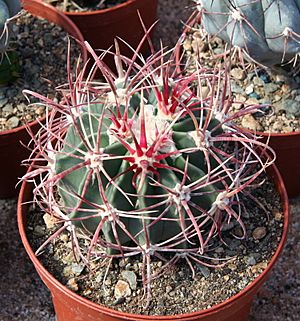Echinocactus parryi facts for kids
Quick facts for kids Echinocactus parryi |
|
|---|---|
 |
|
| Conservation status | |
| Scientific classification |
|
| Kingdom: | Plantae |
| Clade: | Tracheophytes |
| Clade: | Angiosperms |
| Clade: | Eudicots |
| Order: | Caryophyllales |
| Family: | Cactaceae |
| Subfamily: | Cactoideae |
| Genus: | Echinocactus |
| Species: |
E. parryi
|
| Binomial name | |
| Echinocactus parryi Engelm., 1856
|
|
| Script error: The function "autoWithCaption" does not exist. | |
| Synonyms | |
|
Emorycactus parryi (Engelm.) Doweld |
|
Script error: No such module "Check for conflicting parameters".
Echinocactus parryi is a special type of cactus that grows in the desert. People also call it the horse crippler or devil's pincushion. These names come from its sharp spines! This cactus belongs to a group called Cactoideae.
It is only found in one place: the state of Chihuahua in Mexico. This means it is "endemic" to that area. Scientists gave it its name in 1856. It has one other scientific name, which is called a "synonym."
Contents
What is Echinocactus Parryi?
Echinocactus parryi is a barrel-shaped cactus. It is part of the Echinocactus family. This family includes many large, round cacti. They are known for their tough, spiny exteriors.
This cactus is often compared to another one, Echinocactus polycephalus. They look similar at first glance. However, there are some key differences. Scientists look at these details to tell them apart.
How is it Different from Other Cacti?
Echinocactus parryi has its own unique features. It usually has about 13 ribs on each stem. These ribs are the raised lines that run down the cactus. Its spines are "pubescent," meaning they have fine hairs.
The flowers of Echinocactus parryi are bright yellow. They often have a little red color in the middle. These flowers are a beautiful sight in the desert. They help attract pollinators like bees.
Where Does Echinocactus Parryi Live?
This cactus is native to the dry lands of Mexico. Specifically, it grows in the state of Chihuahua. This area has a desert climate. It gets very little rain.
The cactus is well-adapted to this harsh environment. It can store water in its thick stem. Its spines also help protect it. They keep animals from eating it.
Why is it Called 'Horse Crippler'?
The common names "horse crippler" and "devil's pincushion" come from its very sharp spines. These spines are strong and stiff. They can easily hurt animals or people who step on them.
Imagine a horse walking through the desert. If it steps on this cactus, the spines could injure its hooves. This is how it got its famous nickname. It's a warning to be careful around it!
Conservation Status
The Echinocactus parryi cactus is currently listed as "Near Threatened" (NT). This means it could become endangered in the future. It is important to protect this unique plant.
Many factors can threaten cacti. These include habitat loss and illegal collecting. Protecting their natural homes helps them survive.
See also
 In Spanish: Biznaga tonel para niños
In Spanish: Biznaga tonel para niños
 | Kyle Baker |
 | Joseph Yoakum |
 | Laura Wheeler Waring |
 | Henry Ossawa Tanner |


